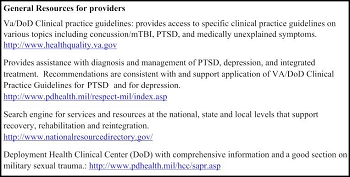
Post Deployment Care for Returning Combat Veteransby Juliette F. Spelman, MD, Stephen C. Hunt, MD, MPH, Karen H. Seal, MD, MPH and A. Lucile Burgo-Black, MDA 24-year-old combat veteran enters a medical clinic. He returned from Iraq 5 months ago after a year-long deployment as an army medic. He was exposed to several blasts from improvised explosive devices, and tells the doctors that he suffered a traumatic brain injury after one incident during which he momentarily blacked out. He injured his back running on uneven ground while wearing body armor, and has chronic pain for which he is taking oxycodone. He reports having a "short fuse," and feels "constantly on edge;" he also reports difficulty sleeping and frequent vivid nightmares. He drinks at least six beers a night to calm down. His wife is upset that he does not trust anyone, and she is frightened that he sleeps with a gun under his pillow. He has been unable to find a steady job, citing an inability to concentrate at work. He tells you "It has gotten to the point where I really don't care what happens to me." As illustrated in this case, deployment to a war zone is an experience that may profoundly impact a veteran's health and personal life, carrying the risk of long-term physical, psychological, and social impairments. Effectively managing these global health concerns can be a daunting task. Healthcare facilities are continuously challenged to orient their personel to the specific health concerns of this unique patient population, and to offer practical management tools to facilitate care. Approximately 2.4 million U.S. military personnel have served in Afghanistan and Iraq in Operation Enduring Freedom (OEF), Operation Iraqi Freedom (OIF), and Operation New Dawn (OND) since the beginning of these conflicts in 2001. To date, roughly 1.44 million of these individuals have separated from the military, are eligible for Veterans Administration services and about 772,000 have used VA health care. The three most prevalent conditions seen in recent combat veterans are musculoskeletal problems, mental health conditions and "non-specific signs and symptoms." Commonly referred to as "medically unexplained symptoms," this third category may include fatigue, somatic, and cognitive complaints (memory, attention and concentration difficulties). The U.S. needs to realize that we must work harder to address these issues in order to respect the service of our veterans. |

 | MegaTopx Healthcare home Copyright © 2019, all rights reserved Privacy policy :: Contact us |
